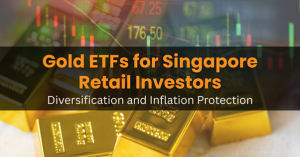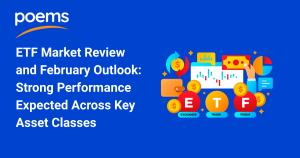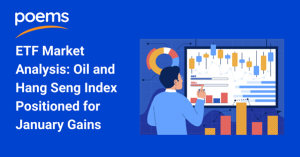ETF Investing for Early Career Individuals (20-30 Years Old) August 19, 2024

Introduction to ETFs and Portfolio Management
For young professionals in their 20s, the early career stage is a crucial time to establish the foundation for long-term financial success. One of the most effective strategies to build wealth over time is through investing in Exchange-Traded Funds (ETFs). These investment vehicles offer a diversified, cost-effective way to gain exposure to various asset classes, including stocks, bonds, and commodities. In this article, we’ll explore how Singaporean investors can utilise these ETFs to manage their portfolios, achieve financial goals, and set the stage for a secure financial future.
1.Understanding ETFs and Their Benefits for Young Investors
What Are ETFs?
- ETFs are investment funds that are traded on stock exchanges, much like individual stocks. They typically track an index, sector, commodity, or other asset class.
- Key benefits include diversification, lower fees compared to mutual funds, and ease of trading.
Why ETFs Are Ideal for Early Career Investors:
- Cost-Effectiveness: Lower expense ratios make ETFs a smart choice for those starting with limited capital.
- Diversification: ETFs provide instant diversification across various sectors and geographies, reducing risk.
- Flexibility: With a wide range of ETFs available, investors can tailor their portfolios to specific financial goals.
2. Investment Strategies for Young Investors
High-Growth Potential ETFs:
- At this stage, investors can afford to take on more risk in pursuit of higher returns. Consider ETFs that focus on high-growth sectors like technology, clean energy, or emerging markets.
- Examples: Global tech ETFs (VGT, XLK), Asia-Pacific ETFs (VPL), and thematic ETFs like those focusing on AI (SMH) or cybersecurity (CIBR).
Broad-based Growth/Equity ETFs:
- In addition to sector-specific ETFs, investors should consider broad-based ETFs and adopt a “buy-and-hold” strategy for long-term growth.
- Examples: S&P500 (VOO, SPY), NASDAQ100 (QQQ/QQQM), Total Stock Index Fund (VT).
Risk Tolerance and Time Horizon:
- Understanding your risk tolerance is crucial. Younger investors generally have a higher risk tolerance and a longer time horizon, allowing them to endure periods of market volatility.
- It is important to recognize the benefits of staying invested over the long term, as this can significantly enhance returns through the power of compounding.
3. Integrating Financial Goals with ETF Investing
Saving for Major Life Events:
- Utilize ETFs to save significant milestones such as buying a home, getting married, or starting a family.
- Balancing short-term savings goals with long-term investment strategies is crucial. Consider setting up separate ETF portfolios for different objectives.
Retirement Planning:
- It’s never too early to start thinking about retirement. Begin by investing in broad-based index ETFs that offer exposure to global markets.
Consider contributing to the Supplementary Retirement Scheme (SRS)to enjoy tax benefits while investing in ETFs.
4. Practical Tips and Resources
How to Start Investing:
- Step 1: Open a Brokerage Account: Choose a brokerage platformhat offers access to both Singapore-listed and global ETFs.
- Step 2: Research and Select ETFs: Use tools like POEMS ETF Screenerto find ETFs that align with your goals.
- Step 3: Regular Contributions: Set up a regular investment plan (RSP)to automate your ETF investments. This approach, known as dollar-cost averaging, reduces the impact of market volatility.
Avoiding Common Pitfalls:
- Overtrading: Avoid the temptation to frequently buy and sell ETFs. Stick to your investment plan to benefit from long-term growth.
- Ignoring Fees: While ETFs generally have lower fees, be mindful of trading costs and management fees that can eat into returns over time.
Conclusion:
Investing in ETFs during your early career is a smart way to build wealth and achieve financial security. By understanding the fundamentals of ETFs, setting clear financial goals, and adopting a disciplined investment approach, Singaporean investors can make the most of their 20s. In the next part of this series, we’ll explore how to adjust your ETF strategy as you transition into mid-career, focusing on income generation and stability.
Your next step: save these useful resources under your investment arsenal.
Disclaimer
These commentaries are intended for general circulation. It does not have regard to the specific investment objectives, financial situation and particular needs of any person who may receive this document. Accordingly, no warranty whatsoever is given and no liability whatsoever is accepted for any loss arising whether directly or indirectly as a result of any person acting based on this information. Opinions expressed in these commentaries are subject to change without notice. Investments are subject to investment risks including the possible loss of the principal amount invested. The value of the units and the income from them may fall as well as rise. Past performance figures as well as any projection or forecast used in these commentaries are not necessarily indicative of future or likely performance. Phillip Securities Pte Ltd (PSPL), its directors, connected persons or employees may from time to time have an interest in the financial instruments mentioned in these commentaries. Investors may wish to seek advice from a financial adviser before investing. In the event that investors choose not to seek advice from a financial adviser, they should consider whether the investment is suitable for them.
The information contained in these commentaries has been obtained from public sources which PSPL has no reason to believe are unreliable and any analysis, forecasts, projections, expectations and opinions (collectively the “Research”) contained in these commentaries are based on such information and are expressions of belief only. PSPL has not verified this information and no representation or warranty, express or implied, is made that such information or Research is accurate, complete or verified or should be relied upon as such. Any such information or Research contained in these commentaries are subject to change, and PSPL shall not have any responsibility to maintain the information or Research made available or to supply any corrections, updates or releases in connection therewith. In no event will PSPL be liable for any special, indirect, incidental or consequential damages which may be incurred from the use of the information or Research made available, even if it has been advised of the possibility of such damages. The companies and their employees mentioned in these commentaries cannot be held liable for any errors, inaccuracies and/or omissions howsoever caused. Any opinion or advice herein is made on a general basis and is subject to change without notice. The information provided in these commentaries may contain optimistic statements regarding future events or future financial performance of countries, markets or companies. You must make your own financial assessment of the relevance, accuracy and adequacy of the information provided in these commentaries.
Views and any strategies described in these commentaries may not be suitable for all investors. Opinions expressed herein may differ from the opinions expressed by other units of PSPL or its connected persons and associates. Any reference to or discussion of investment products or commodities in these commentaries is purely for illustrative purposes only and must not be construed as a recommendation, an offer or solicitation for the subscription, purchase or sale of the investment products or commodities mentioned.
About the author
MuMing Yong
ETF Specialist
Phillip Securities Pte Ltd
Mu Ming traded and invested for more than 8 years in various instruments including ETFs, Equities, Unit Trusts, Options, DLC, CFD, and ILP from the US, SG and HK market. He's a believer of personal finance, macroeconomics, and, technical analysis - so much so that he found himself analysing his social media engagement using trend lines and patterns.

 Gold ETFs for Singapore Retail Investors: Diversification and Inflation Protection
Gold ETFs for Singapore Retail Investors: Diversification and Inflation Protection  ETF Market Review: February Outlook Signals Strong Performance
ETF Market Review: February Outlook Signals Strong Performance  ETF Market Analysis: Oil & Hang Seng Set for January Gains
ETF Market Analysis: Oil & Hang Seng Set for January Gains  Buffer ETFs — What Are They and How Do They Work?
Buffer ETFs — What Are They and How Do They Work? 






